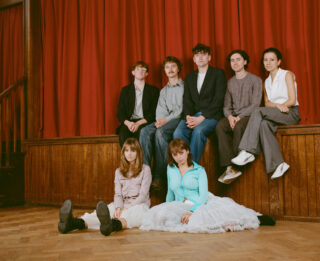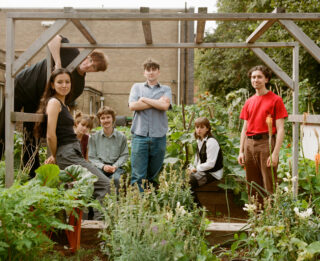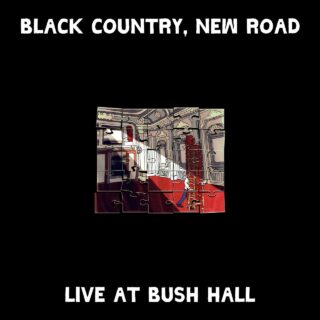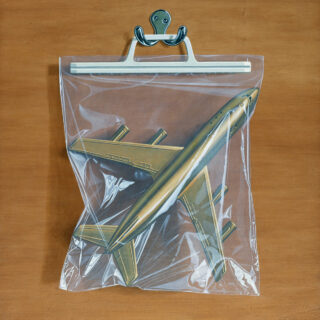Skye Butchard: Congratulations on Ants from Up There. It’s an emotional listen, which caught me off guard. I listened to it on a Megabus the first time, and got a bit teary.
Charlie Wayne: That’s going to happen anyway on the Megabus.
SB: The first album formed in the live setting and morphed over time. How did you approach writing here?
Lewis Evans: It was very refined. Someone would bring in a skeleton of a tune, almost without structure, and we would all pile in with ideas. Everything was up for debate. It was very democratic. Even if it was just one person that had a problem with something, you’re still heard.
It’s meant that though it’s not as punchy-sounding, because it’s not coming from a live setting, every detail is thought over. We as a group of seven people are much happier with the finished product.
SB: Do you have any standouts that you’re excited to play live?
TH: We’ve played a few of them at recent shows. It’s been a surprise how accepting the audience has been of us playing around four from the previous album and six from the new album. ‘The Place Where He Inserted the Blade’ is one that instantly translates to an audience… A thing with a lot of good pop music is that it sounds familiar, but if you interrogate it, you realise there’s complexity behind it. A song like ‘The Place…’ does that, and has its own unique personality. There are these backing vocals that come in that are chanty and passionate, and sound like we’re all sobbing together. You can’t help but be quite emotionally impacted by it.
SB: As well as emotional, there’s also playfulness in the interplay and writing. I’m thinking of the start-stops on ‘Chaos Space Marine’. What inspires moments like that?
LE: We always try and make what we do funny, because it’s a bit stupid. Take the huge guitar distortion sounds on the first album – it’s so dumb. We might as well make a little bit of a joke out of it… With ‘Chaos Space Marine’ especially, there were some ideas that we were going to include that were a bit too stupid. At the beginning, when it stops and there’s a little violin solo, then the melody, and a little piano solo – everyone was originally going to get a solo for two seconds.
TH: We should still do it one day.
CW: It does always serve a purpose, though, doesn’t it? I always think about the bit at the end of ‘Basketball Shoes’. You can’t quite hear it but when the voices come in, behind that, there’s all of us playing the kazoo.
LE: It’s an incredibly stupid idea, but when it’s layered up properly, it ends up sounding massive… If it sounds shit we won’t put it on, but it usually sounds cooler than you would expect.
SB: When bands use humour, it can paradoxically get misinterpreted as a group taking themselves too seriously. Have you come up against that?
TH: I think that people are on board with what we’re doing. We’re being honest. There’s no irony in what we do. It’s just funny. The other purpose it serves, these silly lines that we throw in, are what some might think of as the ‘obvious’ thing to do. People like that our music does things that are slightly weird, but it’s a relief to the ear to hear the obvious stupid thing.
SB: Is that obviousness why you look for inspiration in pop sounds as well?
LE: That, and we just like pop music. It’s our most played music… We listen to a lot of the pop music from when we were kids whenever we’re together. Ke$ha, Beyoncé…
CW: It’s difficult to write music like that. It presented a challenge to write songs that grab your attention and hold it in the way that those tracks do. We’re a band that struggles to write anything that’s shorter than six minutes.
LE: I also just want to add that I’m not putting Ke$ha and Beyoncé on the same level. Obviously Ke$ha is way better.
SB: Not much time has passed since the first album, but you’ve known those songs for much longer. How do you reflect on them?
CW: I don’t think any of us go back to it. It’s not a complete body of work in the way we feel about this one, which is coherent and has structure… Those songs are great. There’s sentimental value in them and they’re musically interesting, but it doesn’t represent anything other than a marker in the ground for where we were.
LE: I listened to it recently for the first time since we got the masters in November 2020. The only thing that holds it together is the production… I like that it’s punchy, and it’s not this clickbait post-punk sound. It’s not macho sounding. It’s got a bit of fragility to it. It’s more of a mixtape.
TH: I feel good about that. It was never going to be a normal first album. It was going to represent a moment in time. When I reflect on it, I don’t feel as emotionally connected to it as I do to this one, which is a better representation of what we all like, and what we’re like as people.
SB: We get more of a personal insight into who you are here. How do you approach that now that you’ve got an audience? Is it more daunting?
LE: It’s a vicious cycle, because the more personal you are, the more people connect with it, but the more you put yourself out there, the more people are going to know about you. It can get complicated. If it’s personal for us, it’s about ten times more personal for Isaac. We don’t have any of our actual voices on the record.
TH: We all feel this is the best thing we’ve been a part of. It’s a baby that we’re proud of and in love with, so it’s not the end of the world if people don’t like it. At the same time, there’s the feeling of releasing something that you’re being so honest about. Maybe it will hurt. These might just be words we’re saying now to make ourselves feel better.
CW: It’s the sort of thing that you say around album six, when nothing has gained traction for the last three or four albums. “You know, I think this is really us.”
LE: The Noel Gallagher vibes of “I’ve been checking out loads of Throbbing Gristle.” Then he releases another shit album.
CW: “I’m pretty sure that even if people don’t like it – we’ll love it!”
TH: “We don’t care what people say.”
CW: I’ll be devastated.
SB: It’s only natural given how well people resonated with the first one. And then there are accolades like the Mercury Prize. How do you take the positives like that?
LE: It’s helpful to do it with your friends. I imagine awards can get to your head, whether it’s making you more introverted or inflating your ego, especially if you’re a solo musician… We do feel out of place every time we do these things. We don’t try to make ourselves feel out of place – we just are. Doing the red carpet at the Mercury Prize was stupid, and I think we made it clear that it was just a bit silly.
CW: There’s also so many of us. It’s a group of seven. That’s like a small group of friends rather than a band. You can fill a whole room with us. You’re never out of company.
LE: With friends, if you meet some knob in the industry, you don’t have to smile at them. You can just tell your mate that he’s a knob.
SB: It’s the other side of the coin, but with fan reactions and the music being turned into a meme, is that something that you pay attention to?
TH: No. A while ago, I might have looked things up on Instagram every now and then, and at most found it funny. Maybe one time I saw something and thought it was a little bit too far and weird.
LE: I’ve had a few creepy things where they’ve tagged me and shit… If you’re going to do it, just don’t let me see it. It creeps me out personally. And we’re a fucking indie rock band. I’m not David Beckham.
CW: I’ll look at the memes until I get freaked out because someone’s taken it in a weird, psychosexual direction.
SB: It’s mad how quickly it becomes that.
CW: It’s a five-minute search.
LE: I came fifth in a pub quiz last night. Why are you doing that about me?
SB: When you’re back on tour, how will you approach these songs? Will they morph like the first album or stay the same?
LE: I think they’ll stay the same for a while, until we get bored of them… I saw Caroline Polachek the other day, and she sang all of Pang exactly the way it is on the record, and she’s been doing this since before lockdown. And to still look like she’s enjoying herself? That’s incredible.
I think given the freedom that we have, most artists would do what we do if they could. We get a fair bit of stick for it, but that’s no way near as bad as it would feel to keep doing the same thing every night… It’s the whole performing monkey thing.
SB: Is that why you’ve thrown in covers like ‘Time to Pretend’ or ‘Hey Jude’?
CW: There is a relative consistency in that they’re all songs that we listened to when we were young. When you’re first in a band with your friends, you play songs you listened to when you were younger. For me at least, it’s revisiting that same space.
TH: We approach it in a childish way. We don’t spend months practicing or interrogating the songs. It’s quite the opposite. Sometimes they’re chosen because the chord progressions are easy.
SB: I wanted to say how gorgeous ‘Mark’s Theme’ is. [The song is a tribute to Lewis’s uncle, who died of COVID in February]
LE: He passed away on February 3rd, two days before the first record, and the album will be out a year and one day after he died. As soon as I found out, I got a tenor saxophone and played around a bit to not think about it. I ended up writing that…
When he was drunk, he used to send me voice memos of him making funny noises. He was from a town outside of Glasgow, and was a big Rangers fan. I didn’t watch much Scottish football, but every time Celtic would lose he’d send me a voice note. The same when England lost. I had hundreds of clips to choose from.
After we recorded it, my first thought was that he would absolutely hate this song. We had to find a way to not make it too emotional, because he would have found that boring and asked where the drums were. The voices make it less serious.
CW: It had a place on the album. Mark was a huge active fan of the band, and supported our music even before Black Country, New Road. We’d all spent time with him, and we all knew him.
LE: It was a strange time. He was in intensive care when we were writing the second album, so the music feels so linked to him and that time even though he didn’t get to hear any of it.
SB: As well as being more personal, this album is a lot more patient. There’s more silence and space. Was that intentional, and do you worry how fans who know you for more upbeat material will react to that?
TH: I think that taking away and having silence, there’s just as much energy in that as when you’re playing hard. If anything, there’s more. That was a very conscious decision. It’s something we’ve been trying to work on quite intensely – trying to create the same amount of impact through doing less and being less chaotic. It’s so easy to play hard and whack on a distortion pedal. If you do it too many times, it’s boring. It also gives each person moments to have our individual say and be heard.
Photography by Rosie Foster








